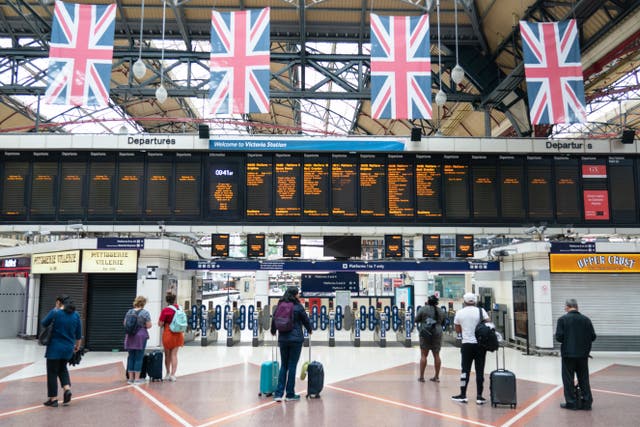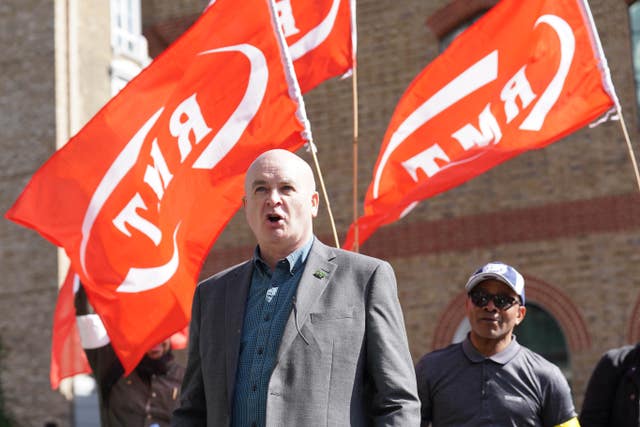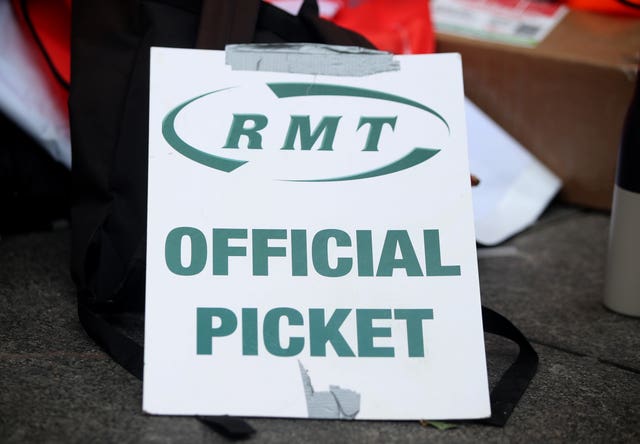New rail strike alert over fears of weekend travel chaos
The rail industry is concerned that many people are reluctant to abandon leisure trips planned for Saturday despite another rail strike taking place.

A fresh alert has been issued to train passengers amid fears that many are reluctant to abandon leisure trips planned for Saturday despite another rail strike taking place.
Only a fifth of services will run and half of lines will be closed as 40,000 members of the Rail, Maritime and Transport (RMT) union at Network Rail and 13 train operators walk out for the third day this week.
Operators are telling passengers they should “only travel by train if necessary” and to check their journey in advance.

Many commuters were able to avoid the disruption caused by strikes on Tuesday and Thursday by working from home.
But people with long-standing plans to travel by train on Saturday – such as for a day trip or holiday, a visit to friends or relatives, or to attend an event – may be keen to press ahead with their trip despite the industrial action.
A rail industry source told the PA news agency that while stations were “relatively quiet” during the first two strike days, there is “a nervousness” about what will happen on Saturday.
Many seaside resorts will have no services on Saturday, including Bournemouth, Dorset; Blackpool, Lancashire; Margate, Kent; Llandudno, north Wales; and Skegness, Lincolnshire.
Cornwall will also have no trains.
Services across Britain will primarily be restricted to main lines, but even those will only be open between 7.30am and 6.30pm.
That means first trains will leave later and last trains will be much earlier than normal.
Many last trains will leave between 3pm and 5pm, with several major stations such as Birmingham New Street, Liverpool Lime Street and Manchester Piccadilly closing at 7pm.
Disruption will continue into Sunday.
Only 60% of trains were expected to run on Friday, mainly because of a delay to the start of services after signallers and control room staff due to work overnight shifts joined the strike.
Phil Whittingham, managing director of Avanti West Coast, which is running around a third of its normal timetable on Saturday, said: “Weekends have seen very strong growth in passenger numbers over recent months and we’re concerned that many who travel at weekends will be less frequent rail users and may not realise the huge impact industrial action will have.
“We’ll be running a significantly reduced timetable on Saturday as result of the strike.
“There will be fully-trained staff on board and at stations across our network, but our trains may be very busy, and destinations will be served less frequently, if at all.”
No resolution to the bitter dispute over jobs, pay and conditions has been reached despite talks this week.
Steve Montgomery, who chairs the Rail Delivery Group, which represents operators, said: “We are very disappointed that the RMT leadership has decided to continue with tomorrow’s strike, and the union leadership has chosen to take action which will severely inconvenience the millions of people who had plans over the weekend.
“While we are doing our best to minimise disruption to passengers, our advice is to only travel if it is necessary, and if you are going to travel, please plan ahead.”
Passengers with pre-booked tickets for Saturday are able to travel on Friday, Sunday or Monday instead, or claim a refund.
Network Rail chief executive Andrew Haines said: “Unfortunately, the RMT’s decision to carry out another day of needless and premature strike action means our passengers will suffer again on Saturday.
“A fraction of trains will run compared to a usual Saturday service, with trains starting later in the morning and finishing much earlier in the evening.
“I am really sorry to our passengers for the inevitable disruption to their journeys and their weekend.”
He added: “We remain at the table and ready for talks, day or night, and will do everything we can to avoid further disruption for our passengers.”

This week’s strikes are estimated to have cost the rail industry up to £150 million in lost revenue and the consequences of aborting planned upgrade work.
RMT general secretary Mick Lynch said its members are “standing up for all working people trying to get a pay rise and some job security”.
He continued: “In a modern economy, workers need to be properly rewarded for their work, enjoy good conditions and have the peace of mind that their job will not be taken away from them.
“(Transport Secretary) Grant Shapps needs to get in the room or get out of the way so we can negotiate with these companies who we have successfully struck dozens of deals with previously.
“What we cannot accept is thousands of railway workers being thrown on the scrapheap after being praised as heroes during Covid.
“RMT will continue its industrial campaign until a negotiated settlement is reached.”
Transport Secretary Grant Shapps said: “On the eve of the third day of the strikes inflicted by the RMT, we would once again urge the union not to keep hamstringing the country.
“What is already clear from this week is the action they are taking, while not having the overall impact they might hope, is hurting the very people they claim to stand up for.

“And if they strike once again tomorrow, it will mean more much-needed hospital appointments will be missed, those who don’t get paid if they can’t get to work will again be out of pocket and, on what is usually their busiest day of the week, small businesses such as pubs will be put under even more financial strain.
“However, while their action is hitting some people at the worst possible time, this week has also shown that overall rail strikes are not as effective a tool for the unions as they once were.
“Despite what the RMT may claim, we have not seen the level of overcrowding on buses or heavy congestion on roads some feared because the world has changed and many more people can now work from home.
“We also haven’t seen freight impacted in the way they may have hoped – with 68% more services running than had been anticipated for yesterday.
“And despite the clear intention to stop thousands from enjoying Glastonbury for the first time in three years, the RMT has not succeeded – with the organisers confirming the impact was minimal.
“The only chaos these strikes are causing isn’t on our transport system but on the day-to-day lives of hardworking people and for businesses around the country.
“Rather than standing on picket lines, union representatives should be back around the negotiating table and agree a deal to bring our rail industry into the 21st century.”





